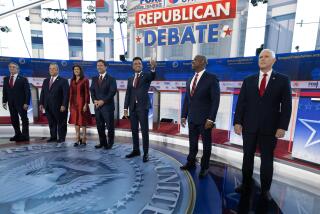Papers Detail Influence of Ideology on Reagan Policies
- Share via
WASHINGTON — Elizabeth Hanford Dole began the debate over raising the 55 m.p.h. speed limit by stressing safety. But in the privacy of the Ronald Reagan White House, the debate turned to states rights, budget worries and election-year politics.
“Mr. (Edwin) Meese felt this is a good issue to put off until December or, politically, we will be seen as raising the speed limit,” read the final paragraph of the minutes of the July, 1986, session in the Roosevelt Room, and the words from the attorney general settled the issue.
The minutes and scores of other documents detailing Reagan’s domestic and economic policy councils were recently released under the Freedom of Information Act.
The hundreds of pages offer a behind-the-scenes look at how officials weighed ideology and politics in setting policy on issues from AIDS to the government’s petroleum reserves to the establishment of minimum government standards for toaster ovens and other household appliances.
They also show that Reagan aides could become exasperated by public criticism.
“The public often does not recognize that environmental protection can conflict with other social goals,” Environmental Protection Agency Chief Lee Thomas said in one council memo. “There are unrealistic expectations of what we can and should achieve.”
The debate over the speed limit on July 24, 1986, went this way, according to the notes:
Dole, then transportation secretary, began by saying that a higher speed limit no doubt would lead to increased highway deaths. But she said she believed that the Administration should support raising it to 65 m.p.h. on rural highways.
Budget Director James C. Miller III thanked her for her analysis and then promptly disagreed, saying that outright repeal of the national limit was the best course because the federal government had no business setting speed limits.
Beryl W. Sprinkel, the President’s conservative top economic adviser, concurred and said safety was not the sole issue.
“Mr. Sprinkel said that if we believe in federalism, we should leave speed to the states and let the consumers decide the speed they will travel,” according to the minutes. “He felt the 55 m.p.h. limit is bad regulatory policy and that we need to be sensitive to costs as well as safety.”
In principle, William E. Brock III and Donald P. Hodel, secretaries of labor and the interior, agreed. But then they talked politics.
According to the minutes, Hodel said: “If we support a federal limit of 65 m.p.h., we could be held responsible for increased deaths.” Added Brock: “If we are wrong on this issue, we can lose votes.”
Meese had heard enough. As chairman of the group, he deferred the decision to another day.
Congress and the White House ultimately agreed to the 65 m.p.h. rural limit. But that did not come until after the 1986 elections, a reflection of White House concern over going against polls that showed overwhelming public support for the 55 m.p.h. limit in effect since the energy crisis of the 1970s.
The minutes, included in the recently released files of the top aide to former Housing Secretary Samuel R. Pierce Jr., show that the most frequent topics of discussion at the domestic policy sessions from 1985 through 1987 were Reagan’s drug policy and how the Administration should respond to the AIDS epidemic.
The council considered a virtually identical memo on AIDS more than a half-dozen times.
In November, 1985, the first paragraph said that 14,000 AIDS cases had been diagnosed in the United States. By May, 1987, the number had grown to 35,000, and the advisers thought it time to name a presidential commission.
Invariably, the potential political impact at home and abroad of suggested policies was discussed.
On one occasion, in December, 1985, top Cabinet members were discussing a plan to retaliate against Japan for unfair trade practices when Trade Representative Clayton K. Yeutter said that Japanese Prime Minister Yasuhiro Nakasone had asked that the action at least be delayed two weeks until the Japanese parliament adjourned.
The Reagan advisers agreed, and Treasury Secretary James A. Baker III said the Administration would need “a public line” if asked to explain the delay. Although the Administration had a plan in hand, Baker, according to the minutes, said that the official position would be that it was just drafting one.
The topics of the power policy sessions were not always so weighty.
For a February, 1987, meeting, the subject was appliances.
Instead, a memo to the advisers suggested that the Administration take a stand because under the bill, “90% of current frost-free refrigerators could no longer be sold.”
They decided on a classic Washington course of action--suggesting amendments to relax the standards and recommending that the President sign the bill if it were altered.
More to Read
Get the L.A. Times Politics newsletter
Deeply reported insights into legislation, politics and policy from Sacramento, Washington and beyond. In your inbox three times per week.
You may occasionally receive promotional content from the Los Angeles Times.










